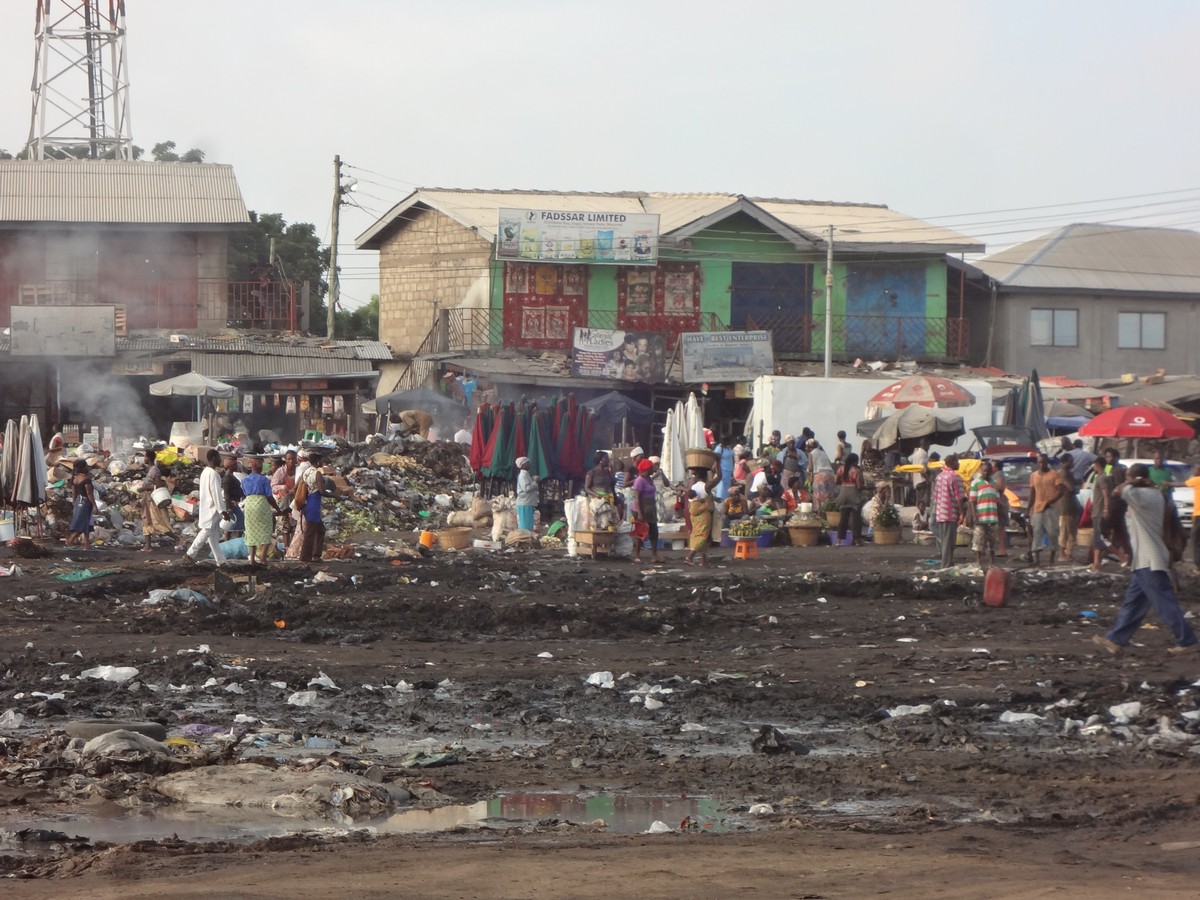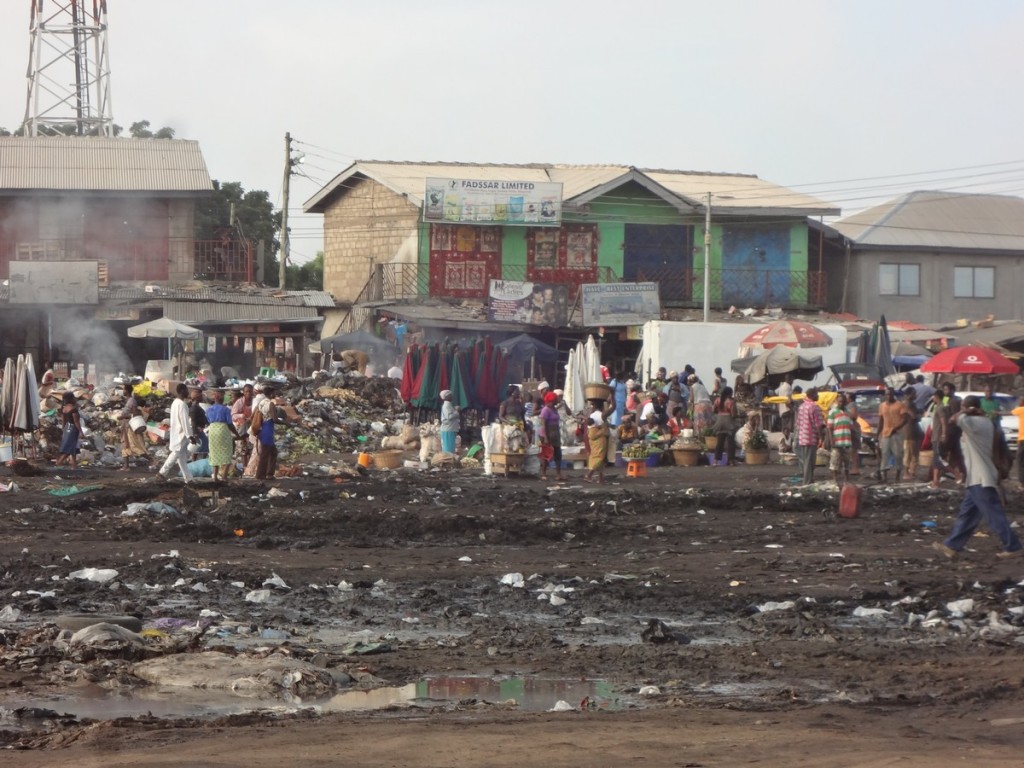Give the slum a try!
Posted by By Akogun Akomolafe at 7 April, at 00 : 00 AM Print

Warning: count(): Parameter must be an array or an object that implements Countable in /home/alaye/public_html/wp-content/themes/Video/single_blog.php on line 56
(a satire)
(This was written and published some years ago. However, my visit to Chorkor in Accra on Saturday, October 26, 2013, revealed to me the shocking conditions many compatriots are still forced to live, and prompted this republishing.
Why do we still allow some of our people to live in these types of poor conditions in spite of the vast mineral wealth under our soil which, if probably harnessed could very, easily, banish hunger, poverty and poverty from our midst?
I find it unconscionable that our leaders, who will not keep even their pests in this appalling conditions, seem not to see anything wrong in seeing their fellow human beings existing in these pitiful and dehumanizing conditions.
There are schools scattered around Chorkor and, as part of their curriculum must study Environmental Science. The question is beggared: Rather than force these children to cram tons of useless theories on hygiene, why can’t they be given marks for how they clean and beautify their residences?
Solutions, anyone?)
—- end of soap
“Look at that, Trench Town rock
I say don’t watch that, Trench Town rock
If you big fish or sprat, Trench Town rock
You reap what you sow, Trench Town rock
And everyone know now, Trench Town rock
Don’t turn your back, Trench Town rock
Give the slum a try, Trench Town rock
Never let the children cry, Trench Town rock
Cause you got to tell Jah, Jah why
Grooving, grooving, grooving, grooving.” – Bob Marley
Alhaji Abdullahi Walatakiki has a presence. Tall, urbane, elegant and dressed in an English upper-class suit, he cut the image of a top banker or a diplomat at the highest echelon of his profession.
Alhaji is the Assistant Deputy Minister at the Ministry of Finance.
I ran into him at a newspaper’s office recently, he was busy defending his government’s policies.
At the end I managed to swindle a few minutes of Alhaji’s expensive time.
“Could it be true that the government wanted to borrow US$5 million to study poverty?” I wanted to know.
Alhaji cleared his throat the way only the upper class knew how. “The whole thing has been blown out of all proportions. There’s nothing wrong in borrowing, per se. Every businessperson knows that. Every government in the world has had to borrow money to finance one project or the other. There’s nothing wrong in government borrowing.”
“But is studying poverty a viable project for which to take a loan. Is that not akin to a business taking up a loan to study why it is making a loss?”
The Minister gave me a condescending look. “What’s wrong in that? What’s wrong with a failing business hiring a business consultant to come and help it fix its problems?”
“With borrowed money?” I asked skeptically.
The Minister was obviously in a combative mood. Giving me a withering look, the one you gave an errant servant, he mused, “I guess you missed your Economics 101.”
“No sir, I didn’t miss my classes. It is just that I fail to see the logic in your argument. Why does an already highly-indebted, poverty-ridden and a virtually bankrupt third world country need a loan to find out why it is poor?”
“The reasons should be self-evident except to those for whom thinking is an encumbrance.” The Minister countered with sniggering contempt. “Do you know the number one problem we have in this country?”
“That’s not my department, sir.”
“I will tell you our biggest problem in this country. It is that there are too many experts. We have too many lazybones masquerading as experts. The biggest wahala in Ghana is the profusion of armchair critics. Take it from me that is our biggest problem. Look at yourself for instance, all criticism and none of them constructive.”
“I am sorry you felt that way about me, sir. But we still haven’t answered the question of why we need a loan to study why we are poor. Couldn’t part of our problems be the lack of articulation of policy-intents by those in power?”
“You’re right to an extent. This government has always been responsive. The idea was jettisoned right when it was discovered that the people are against it.”
“I think the people were simply stupefied by the sheer effrontery of the idea. They have seen all the Poverty Alleviation programs lining only the pockets of our moneybags. They see that the only people that would benefit from the loan would be our deep pockets who will shuttle from one conference to another in their multimillion cedis Pajeros. In the name of fighting poverty, our cash-oozers will wine and dine at restaurants where food prices look like telephone numbers…”
The Minister cut in, “You certainly have fancy-phrases. ‘Moneybags,’ ‘deep pockets,’ ‘cash-oozers.’ You see what I mean by armchair critics? You see only the Pajeros and food bills, but what about the anguish our delegates to those conferences have to go through?”
“Anguish, sir. What anguish.”
“Conferences don’t come cheap. That’s what we have to understand in this country. We should also jettison the idea that we could get something for nothing. Every good thing cost money. Part of our problems also is that we are too much in a hurry to get to the Promised Land. How do you solve a problem without understudying the underpinning theoretical basis? You see we live in a scientific era, information superhighway, globalisation, computers, mobile phones and things. We cannot continue to tackle our problems in traditional and old superstitious ways.”
“Hmm. Don’t you think that part of our problem could also be that there is this yawning inequitable distribution of resources?”
“It is incredible that you could still be pantomiming discredited socialist ideas in this age and time. The idea that we could improve the lots of the poor by impoverishing the rich has been discredited.”
“I am not talking EQUAL distribution of wealth. I am simply talking about EQUITABLE distribution of the little resources we have. We cannot continue to maintain the fiction that our poverty stemmed from lack of resources. It did not. We have the resources; the problems come from the way we are allocating it. Don’t you think that we could do with a little bit of egalitarianism?”
“There we go again with armchair criticism. In your case, the criticism are wide and far off the mark. What specifically is your gripe?”
“I could give specifics like granting our legislators cars and housing loans. It should not be the business of government to grant loans. A legislator that wants to buy a car or a house should go to his bank. It should strictly be the business of himself and his bank manager. We are a poor country and those that purport to serve us should not impose upon us financial burdens that do not exist even in the richest of the developed countries. In Holland, for instance, I know legislators that take the trains from Amsterdam to The Hague to go and represent their people. Holland can afford to buy cars for her lawmakers, but she would not. Why should an MP representing a poor constituency tools around town in a big jeep? What’s he trying to portray? We can take the case of our ministers. Why should they get free cars, free phones and free houses from the government? Those from whom we are running to borrow the money do not give their ministers free cars, free telephones and free housing. I say it is only in Africa that the poverty of the poor is not reflected in the opulent lifestyles of those that govern them. We are going to take loan to study poverty while our president travels around in a cavalcade of expensive cars. Do we think that those from whom we’re borrowing are unaware that our president goes around in a multi-billion cedis motorcade? And we pretend not to understand why they are reluctant to ease our debt burden. They are no fools. If those that govern us want to know why we are poor, let them come to our rat-infested, mosquito-overwhelmed ghost towns (ghost towns are ghettos within ghettos) their policies have consigned us. If they are serious about tackling poverty, let all our legislators come and spend a week at Alajo. Let our president spend a few days at Sahara. Let our ministers stop pontificating and experience the wretched lives they have foisted upon us. Let our sick leaders stop rushing to London and Paris for treatment; let them go to the blood-plastered slaughterhouses they call hospital. Let them withdraw their children from their expensive international schools and send them to the rickety building they call schools. Let our rulers abandon their jeeps for one week only, and experience the joys of traveling in our trotros. Let those that are ruling us give the slum a try. That is all the education they need to understand poverty.”
About the Author
Femi Akomolafe, a passionate Pan-Africanist, was one of the PCs Pioneers and ran a Computer Consultancy firm in Amsterdam, the Netherlands for several years, where he also set up the first African Bulletin Board System (BBS), the precursor to the Internet. He also established the first Black Newspaper, The African, in the country.
Femi has been very active in the Pan African Movement since the early 1990s.
A columnist for ModernGhana and a Correspondent for the London-based New African magazine, Femi lives in both Europe and Africa and writes regularly on Africa-related issues for various newspapers and magazines.
Femi was the producer of the FOCUS ON AFRICANS TV Interview programme for the MultiTV Station.
He is also the Man and Machine Coordinator at Alaye Dot Biz Limited, a Kasoa-based Multimedia organization that specializes in Audio and Video Production. He loves to shoot and edit video documentaries.
He is currently engaged in vegetable farming.
His highly-acclaimed books (“Africa: Destroyed by the gods,” “Africa: It shall be well,” “18 African Fables & Moonlight Stories” and “Ghana: Basic Facts + More”) are available for sales at the following bookshops/offices:
- Freedom Bookshop, near Apollo Theatre, Accra.
- WEB Dubois Pan-African Centre, Accra
- Ghana Writers Association office, PAWA House, Roman Ridge, Accra.
Where to buy them online:
On Lulu Books:
18 African Fables & Moonlight Stories https://goo.gl/Skohtn
Ghana: Basic Facts + More: https://goo.gl/73ni99
Africa: Destroyed by the gods: https://goo.gl/HHmFfr
Africa: It shall be well: https://goo.gl/KIMcIm
Africa: it shall be well
on Kindle books: https://www.createspace.com/4820404
on Amazon books: http://goo.gl/QeFxbl
on Lulu Books: https://goo.gl/SQeoKD
Africa: Destroyed by the gods
on Kindle books: https://www.createspace.com/4811974
18 African Fables & Short Stories: https://goo.gl/s9tWAf
on Amazon books: http://goo.gl/1z97ND
on Lulu Books: http://goo.gl/KIMcIm
My Lulu Books page: http://www.lulu.com/spotlight/FemiAkomolafe
Get free promotional materials here:
- Africa: it shall be well: http://alaye.biz/africa-it-shall-be-well-introduction-in-pdf/
A FREE Chapter of ‘Africa: It shall be well’ can be downloaded here: http://alaye.biz/africa-it-shall-be-well-a-free-chapter/
- Africa: Destroyed by the gods (How religiosity destroyed Africa) http://alaye.biz/africa-destroyed-by-the-gods-introduction/
A FREE Chapter of ‘Africa: Destroyed by the gods’ can be downloaded here: http://alaye.biz/africa-destroyed-by-the-gods-free-chapter/
Contact Femi:
Femi’s Blog: www.alaye.biz/category/blog
Website: www.alaye.biz
Femi on Amazon https://www.amazon.com/author/femiakomolafe
Femi Akomolafe’s Lulu Books page: http://www.lulu.com/spotlight/FemiAkomolafe
Twitter: www.twitter.com/ekitiparapo
Facebook:https://www.facebook.com/Femi Alaye;
Gmail+: https://plus.google.com/112798710915807967908;
LinkedIn: www.linkedin.com/in/femiakomolafe;
YouTube Channel: https://www.youtube.com/user/fakomolafe
Email: fakomolafe@gmail.com
Profile on New African magazine: http://newafricanmagazine.com/tag/femi-akomolafe/
Kindly help me share the books’ links with your friends and, grin, please purchase your copies.
Comradely,
Femi Akomolafe
Alayedotbiz, Blog, Polemics, Random Musings, Satire, Short Stories






